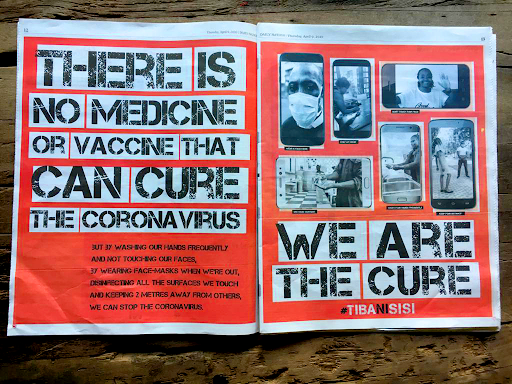Galvanising the private sector to combat a global pandemic – Lessons from Safe Hands Kenya
The spread of COVID-19 constantly highlights the risks of societal inequalities, especially for low-income families who often live in dense informal settlements where practices like social distancing are simply not possible. Further, working from home is typically not an option as informal employment is more commonplace, and most make a precarious living. As such, people are forced to venture out to try and make some daily income. In Nigeria, a Dalberg Research study found that Kwara, Ogun, Osun, Ondo and Rivers states have a large share of population that share toilets, and have no access to water at handwashing stations; thus increasing the risk of COVID-19 infection in these areas.
Combatting an invisible threat
A new model must be designed in order to support and protect communities that can least afford to sustain the impact of a pandemic on their lives and livelihoods. One of such models is Safe Hands Kenya (SHK), which aims to provide that new model in a country where only 550 intensive-care-unit beds exist for 50 million people, and where over 90 percent of people in most counties lack proper hand-washing facilities.
The most practical tools for slowing spread in Kenya, and Africa more broadly, focus on driving behaviour change, providing masks, and providing hygiene and sanitation at scale—particularly in high-risk “hot spots” like public spaces. However, many vulnerable communities lack both the practice and the financial means for such preventive measures—particularly for a crisis that may last many months or years. Therein lies both the challenge and the catalyst for Safe Hands Kenya.
An alliance of many
Rather than bringing external capabilities to Kenya, Dalberg quickly realised the need to rapidly pivot local knowledge, talent, and idled capacity towards tackling COVID-19. The SHK initiative began as an alliance of nearly three dozen Kenyan companies and social enterprises committed to deploying their resources to tackle this problem at scale. Dalberg’s Nairobi team served as the operating basecamp, while Dalberg Catalyst, a US non-profit under the Dalberg Group umbrella, served as the fiscal sponsor for Safe Hands Kenya.
Together, the companies used agile methods to design data-driven interventions, including a geospatial supply and demand allocation map that bypasses traditional supply chain flows for quick crisis mitigation. Every part of the value chain was covered —from optimising idle manufacturing, to providing youth employment opportunities, to consumer education—and each company suspended the profit motive to ensure vulnerable Kenyans have access to sanitation products at no cost.
Targeted, large-scale distribution was only half the challenge—it was vital that people understood why and how to use the products effectively through consumer awareness. Thus, Safe Hands Kenya launched a massive consumer education campaign to drive adoption and maximise public health benefits.
Branded #TibaNiSisi (“We are the Cure” in Swahili), the campaign lived across social media, print, TV and online publications, showing people how to stay safe, and providing practical guidance on hygiene and sanitation. It was designed with users in mind and focused on building motivation and confidence in people’s agency—their ability to take action to protect themselves and their loved ones. #TibaNiSisi speaks directly to people, learning from feedback and data from distribution trials to ensure the messaging stays relevant and impactful.
Impact at scale
SHK showcases the dynamism, responsiveness, and entrepreneurship of Kenya’s private sector. Over 1.25 million people were reached during the first two months of the pandemic in Nairobi—with 2 million more people on track to be reached soon after. SHK’s focus on optimising idled manufacturing capacity resulted in numerous locally produced resources—including making and distributing more than 87 tons of soap, setting up 1,500 locally manufactured handwashing stations, and producing 500,000 masks locally per week. Further, production numbers are expected to increase significantly in the coming months.
Lessons for Nigeria
With lockdowns eased in all Nigerian cities, there has been a surge in domestic movement – increasing the risks of community infections. This signals a need for more innovative interventions to promote access to preventive measures by expanding sanitation options across the country to prevent COVID-19 infections, as well as ensure lifelong health benefits.
SHK is inspiring action across the continent with the scalable nature of its model. For example, Tanzania’s private sector has replicated this work through its Mikono Safi Na Salama initiative (“Clean and Safe Hands” in Swahili), and other countries are following suit, as evidenced by an emerging coalition anchored in Ethiopia’s manufacturing sector.
SHK illustrates that through private sector partnerships and community activations, countries on the continent can innovate quickly in times of crisis to design unique solutions that are tailored to the local context, yet scalable to other parts of the world. Finally, SHK illustrates the importance of utilising home-grown talent and resources to meet vulnerable Nigerians where they are.
This article was originally published at length on Dalberg’s official website. For more information on Dalberg’s study analyzing access to toilets and clean water in Nigeria, reach out to the Dalberg Lagos Office.






